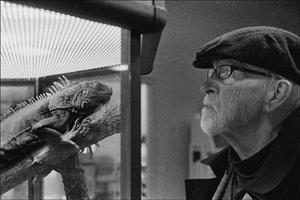Interview by Tess Taylor ’00
 |
David Ferry ’46 won this year’s $100,000 Ruth Lilly Poetry Prize, presented annually by the Poetry Foundation to recognize the lifetime accomplishments of a living U.S. poet. He has authored, edited or translated more than a dozen books. His first, On the Way to the Island, was published in 1960. He spoke to Tess Taylor about writing, translation and his wife, Anne.
Q: You’ve published a number of books of translations and are now working on a translation of the Aeneid. Each of your books of poems also contains translations. What would you say about your experience of working as a translator?
A: In the early 1980s, not having read much Horace, I translated one ode of Horace’s, and a friend of mine at BU, Donald Carne-Ross, liked it and liked my poems, and he began to assign other poems to me. I got hooked. Another friend, at Harvard, William Moran, asked me to make verses out of his scholarly, word-for-word English translation of two passages in the Gilgamesh epic. I fell for the Gilgamesh and my rendering of it. I certainly didn’t start out with an ambition to become a translator. Sort of accidental, but also kind of a love story.
Q: When did you first come to poetry?
A: At Amherst, reading Frost, [Alexander] Pope and [Wallace] Stevens with Reuben Brower; [Gerard Manley] Hopkins with G. Armour Craig; Shakespeare with Cesar Lombardi Barber and Theodore Baird. I can almost say, and I mean it seriously, that my whole life as a teacher and, though I didn’t know it at the time, as a poet, was determined on the days when I heard what happened metrically in the third foot of the third line of Frost’s “Spring Pools.” It blew the top of my head off.
Q: Tell me about your time at Amherst.
A: It was extremely valuable in lots of ways, though Amherst then, with its fraternities and relatively un-diverse student population, was much less interesting socially than it is now. I was drafted after my freshman year, and it was almost four years before I got back from the army. I had the incredible luck of having Reuben Brower as my composition teacher, and then Cesar Lombardi Barber and Armour Craig and Theodore Baird, and I was floored. I knew I wanted to talk about the insides of lines of poetry forever.
Q: Your wife, Anne Ferry, wrote a great book about Milton, compiled a terrific anthology and then wrote a meditation on the work of making anthologies. She seems to have been a wonderful person to think about poetry with.
A: The love poems in my books do share something about our lives together. After her death, Stanford published her last book, By Design: Intention in Poetry. That amply shows that she was indeed “a wonderful person to think about poetry with.” For her readers, for her students, for me.
Q: You published On the Way to the Island when you were in your 30s. Then there’s a gap of 23 years until the appearance of your next book, Strangers. Would you tell us something about your life during those years?
A: Simplest answer: slow writer, two or three poems a year, 20 years means a book—trying to make the book have some sort of coherence; teaching; committees; bone-lazy.
Q: Many of the titles of your books of poems—Dwelling Places, Of No Country I Know, Strangers—reference inhabitation or the place we fail to inhabit. Does this trope of belonging versus not belonging help us understand how you think about poetry?
A: Anne gave me the titles of all those books. I do notice that there is a lot of stuff about displaced figures. We happen to own a print of [French painter Antoine] Watteau dressed up as a figure of a shepherd for the Fêtes Vénitiennes. I put him in a poem called “Civilization and Its Discontents.” He’s a sad, brave guy playing a pathetic little musette—very different from the lords and ladies dancing around him. What with my long, happy marriage and my marvelous children, I don’t think this aloneness, in this case or any other in my poems, has some expressly autobiographical correlation, but it may be something in the way one feels and observes, all of us.
Q: What modern poets do you read?
A: I think I want to focus here on who’s not living. The biggest for me, the poets who have had the most effect on my life and work, are Wordsworth, Frost and Stevens. In college, I wrote Stevens a letter and he wrote a letter back. Thrill of my life!
Q: You’ve been active both in writing poems about homeless people and in doing ministries to the homeless. I’m struck by the idea that poems themselves might be a figure of homelessness—that in your thinking and work, poems may not “belong” to anyone, or to any one place or home. Do you think there’s something there?
A: You know, I hadn’t thought of it that way, but now that you mention it, it seems you could be right. We read to find a place to dwell on, and even in, for a time; it’s of no country I know. There are many strangers in it, including myself. My Anne knew that about my poems when she gave those titles to my books. If she were alive now, I bet she’d have given my new book the title I give it: Bewilderment.
Tess Taylor, a poet, wrote the feature “Stories in the Attic” for the Winter 2011 Amherst magazine. This interview is adapted from a longer piece that appeared on poetryfoundation.org.
Photo by Stephen Ferry